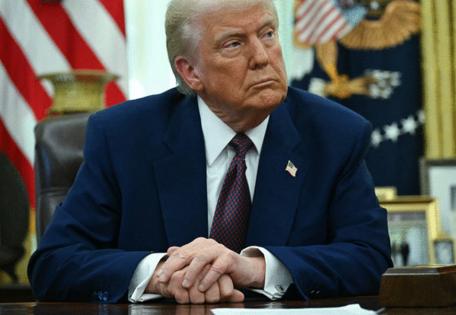Stocks rebound fizzles as Trump goes on offensive: Markets wrap
Published in News & Features
A rebound in U.S. stocks evaporated this week after Chair Jerome Powell pushed back on the idea of the Federal Reserve stepping in to bolster markets, rankling President Donald Trump who touted a smattering of deals Thursday.
The S&P 500 slumped 1.5% over the four-day span, briefly trimming losses after Trump said there would be a trade deal with the European Union, without giving details or a timeline on when an agreement would be reached. He was more decisive on a critical U.S.-Ukraine minerals accord, saying that a deal would be signed next week. The gains eventually melted away and choppy trading ahead of Friday’s holiday left the tech-heavy Nasdaq 100 with a 2.3% weekly loss.
Trump lashed out at the Fed chair on social media, saying Powell’s termination from his post can’t come quickly enough, arguing that the central bank should have lowered interest rates already this year, and in any case should do so now. Later in the day, Trump told reporters he could force Powell out if he wanted to.
The rebuke came after Powell pierced the market calm Wednesday by indicating he would take a wait-and-see approach to how the trade war would impact inflation, dashing hopes for an immediate intervention. The moves were far smaller than the prior week when Trump’s trade war machinations drove wild swings in stocks, bonds and the dollar.
All the tariff policy pivots have eroded confidence in the world’s reserve currency, with the dollar extending its losing streak into third week.
In the bond market, yields on Treasuries climbed Thursday as U.S. government bonds pared q weekly advance. Rising oil prices added pressure as did Trump’s sallies aimed at Powell.
To Krishna Guha at Evercore ISI the independence of the Fed will be a sticking point in the days ahead as tariffs bleed through to consumer prices.
“Continued confidence in the Fed amid a loss of confidence in the administration has shaped the market response to date: real rates / real term premia higher, dollar lower, less U.S. exceptionalism in equity markets – but well-behaved inflation expectations and no stagflation panic,” the former executive at the New York Fed wrote in a note to clients.
A case involving two heads of independent regulatory agencies ousted by Trump bears watching for any implications to the central bank.
“If you liked the tariff debacle in markets, you’d love the loss-of-Fed-independence trade,” Guha said.
Economic data Thursday were mixed. Applications for U.S. unemployment benefits fell to the lowest level in two months, signaling a stable labor market. Meanwhile, the Philadelphia Fed Index tumbled, trailing all economists estimates, a warning shot from manufacturing.
Energy was one of the best performing stock sectors as WTI crude climbed more than 5% — its biggest weekly gain this year. Treasury Secretary Scott Bessent has said he was prepared to take action to get Iran’s energy exports down to zero.
In company news, health insurers slumped after UnitedHealth Group Inc. slashed its earnings outlook for the year, the company’s plunge weighed on the blue-chip Dow Jones Industrial Average which tumbled 1.3%. Shares of Alphabet Inc. dipped after a federal judge found Google was illegally monopolizing some online advertising technology markets. Eli Lilly & Co. soared on positive data from a weight-loss pill study.
Trade war
Following the turmoil triggered by the announcement of broad U.S. levies earlier this month, investors are focusing more on developments in country-specific trade negotiations. Key questions surround China, after Beijing indicated Wednesday it has several conditions for agreeing to talks with the Trump administration.
The U.S. and Japan kicked off negotiations with an aim to reach a deal as soon as possible, top Japan negotiator Ryosei Akazawa said. Preparations are underway for a second round of discussions later this month, he said.
Countries are racing to negotiate deals with the U.S. to avert high import taxes Trump imposed — and then quickly paused — on about 60 trading partners. That move put a 24% across-the-board tariff on Japanese imports on hold, though a 10% baseline charge still applies — as well as 25% levies on cars, steel and aluminum.
“The trajectory of U.S.-Japan trade talks will continue to be closely monitored, not just for their bilateral implications, but also as a potential framework for how the U.S. may approach trade relationships with other allies,” said Rajeev De Mello, a global macro portfolio manager at Gama Asset Management.
The ECB lowered interest rates for the seventh time since last June as global trade tensions threaten to derail the region’s economic recovery. The deposit rate was decreased by a quarter-point to 2.25%, as predicted by almost all analysts polled by Bloomberg.
In commodities, gold hit a record earlier Thursday on demand for havens, before turning lower.
Some of the main moves in markets:
Stocks
—The S&P 500 rose 0.1% as of 4:02 p.m. New York time
—The Nasdaq 100 was little changed
—The Dow Jones Industrial Average fell 1.3%
—The MSCI World Index rose 0.2%
Currencies
—The Bloomberg Dollar Spot Index was little changed
—The euro fell 0.3% to $1.1370
—The British pound rose 0.2% to $1.3266
—The Japanese yen fell 0.4% to 142.42 per dollar
Cryptocurrencies
—Bitcoin rose 0.8% to $84,969.84
—Ether rose 0.8% to $1,585.43
Bonds
—The yield on 10-year Treasuries advanced five basis points to 4.32%
—Germany’s 10-year yield declined four basis points to 2.47%
—Britain’s 10-year yield declined four basis points to 4.57%
Commodities
—West Texas Intermediate crude rose 3% to $64.37 a barrel
—Spot gold fell 0.7% to $3,318.85 an ounce
(With assistance from Alyce Andres, Aya Wagatsuma, Julien Ponthus, Anand Krishnamoorthy, Allegra Catelli, John Viljoen and Michael Mackenzie.)
©2025 Bloomberg L.P. Visit bloomberg.com. Distributed by Tribune Content Agency, LLC.







Comments